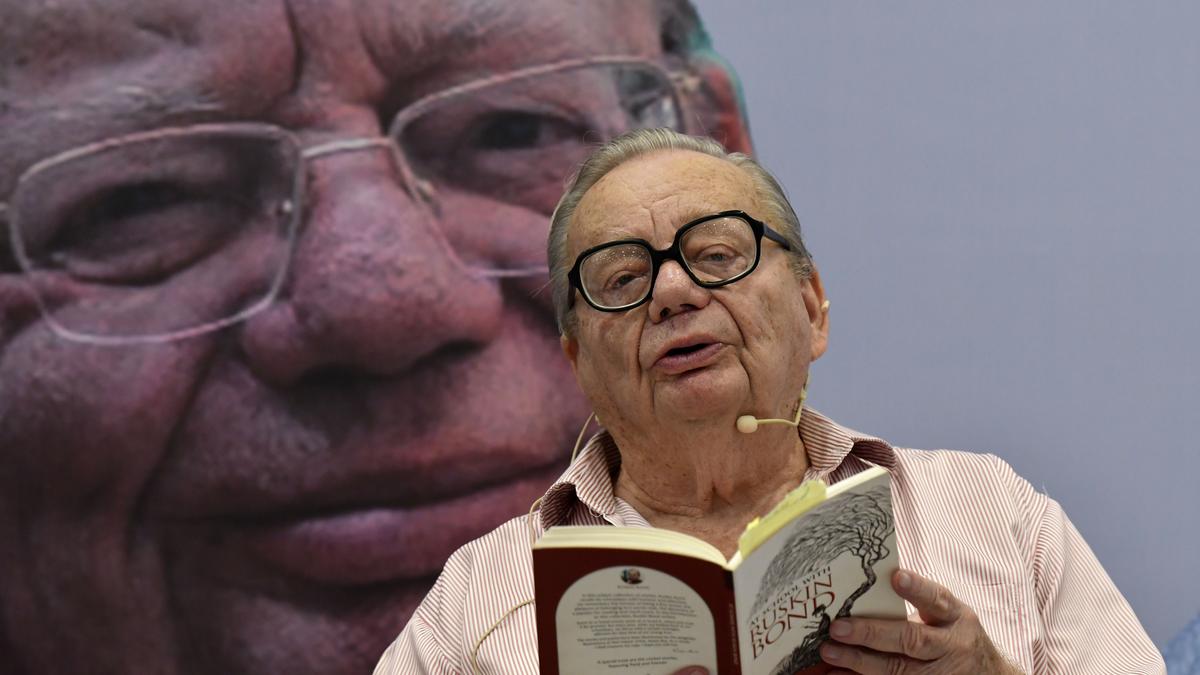
A writer who offers ‘a note of cheerfulness in a world of conflict and uncertainty’ Premium
The Hindu
A list of books written by Ruskin Bond
“Who is your favourite author?” I asked some children at a library in Coimbatore recently. “Ruskin Bond,” was the chorus. The answer to his unwavering fan base lies, perhaps, in these lines that open The Hill of Enchantment (Aleph/2024): If a writer wishes to create a little magic with his pen he must find a little magic in his life. In this book, Bond opens up about “the magic in his life” that shaped him into the beloved author that he is, both among children and adults.
Given his prolific output, there is a bit of repetition. But you also get to read his first poem, written as a schoolboy, and his classmates’ reactions to it. To those who bemoan the decreasing number of readers today, Bond advises them to think again: “Those who think there aren’t many book readers around today would be surprised to know that there were even fewer circa 1950. In a class of twenty, there were only two who actually read any books...” The last line probably holds true even today. Reading his books is almost like seeing what he is writing about. Here is the answer to that: “I have a good visual memory, and the past — especially those childhood years — comes back to me in the form of pictures.” The Hill of Enchantment is like taking a walk with Bond through the important chapters of his life and returning to Ivy Cottage in Mussoorie and watching the fairy lights of Pari Tibba through his window.
How to be Happy (HarperCollins, 2024), as the title indicates, has the author offering “a note of cheerfulness” for his readers who live “in a world of conflict and uncertainty”. Bond’s advice is what you’d expect from a loving grandfather who has lived a full life and been through a lot. “Happiness will come if you don’t run after it,” he writes. His prescriptions are not new but reading them through the lens of his experiences makes you think. One set that is sure to make some parents happy is “Make your own beds, dust your room, your desk, your books.”
But what stayed with me was this: “Pursue your passion. But passion by itself isn’t enough. It must be backed by the honing of our skills and the aim for perfection. ... We fall short of it, of course. But the striving for perfection often does lead to glory.” Today, when “pursue your passion” is a mantra, the latter bit about honing skills and aiming for perfection is often forgotten leaving quite a few adrift in the choppy sea of life.
Angry River (1972) was his first children’s work, first published in England and later in India by Puffin. Sita lives with her grandparents on a small island. During the monsoon, her grandmother falls ill and has to be taken to a hospital. Left alone, Sita keeps busy feeding the hens and cleaning the hut. But the rains don’t stop and the river begins to rise. Sita climbs up a tree as the mud banks begin to crumble against the water’s onslaught. “The river was very angry, it was like a wild beast, a dragon on the rampage, thundering down from the hills and sweeping across the plain, bringing with it dead animals, uprooted trees, house hold goods, and huge fish choked to death by swirling mud ” Rescued by Krishan who is on his boat, Sita manages to reach Shahganj to find her grandmother dead. “And she knew then that it would be her shoulder that Grandfather would have to lean on in the years to come.”
On the one hand, Sita is child enough to talk to her doll and liken Krishan to the god Krishna her grandmother used to tell tales about. On the other is her maturity in taking care of the house and even rebuilding it. Read today in the light of the impact of climate change on the marginalised and vulnerable, it seems uncannily prescient.
As a youngster, Bond left India for England but returned in just two years. But his homesickness gave birth to two novels: The Room on the Roof (which won the John Llewellyn Rhys Prize) and its sequel Vagrants in the Valley. Both follow the adventures of Rusty, a young Anglo-Indian boy who runs away from his strict guardian. While the first ends with Rusty and his one-time student setting off to Dehra, the second sees Rusty growing in maturity and finally selling his father’s first edition of Alice in Wonderland to leave India for England.











